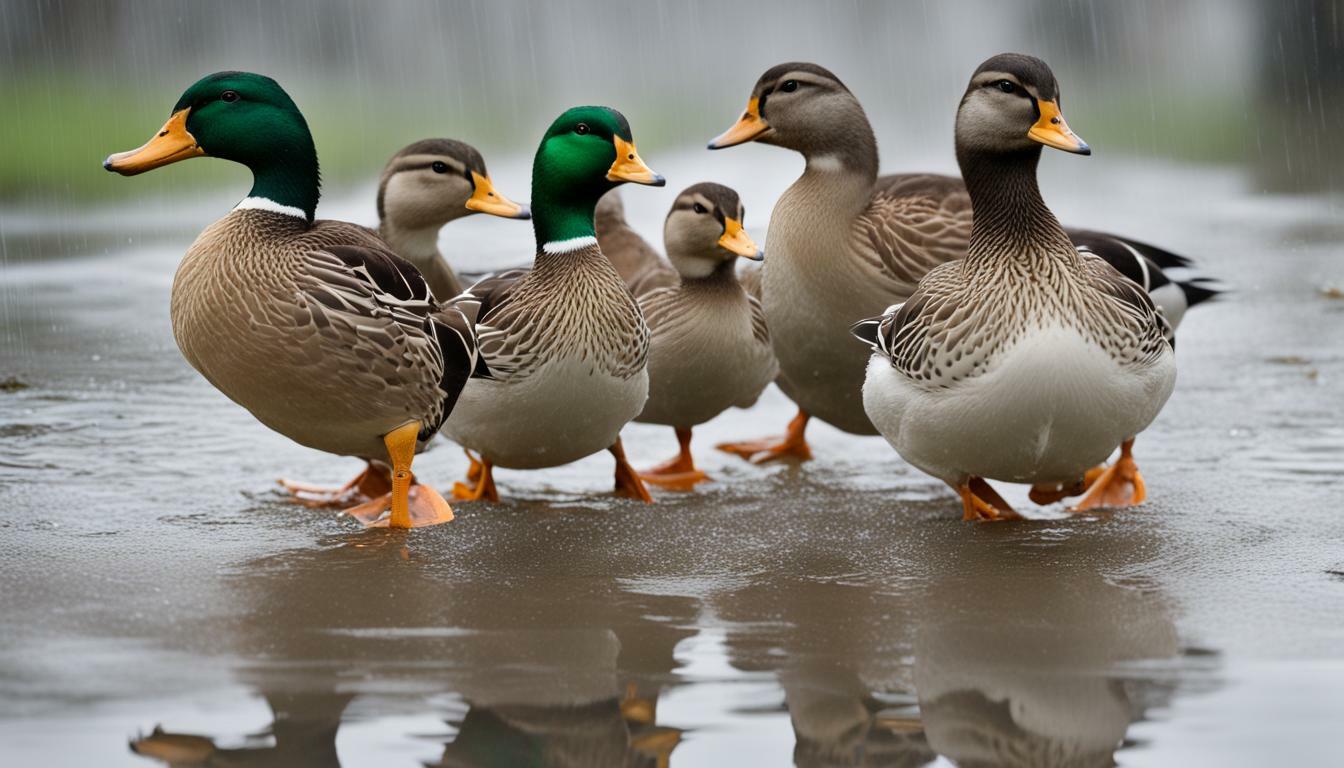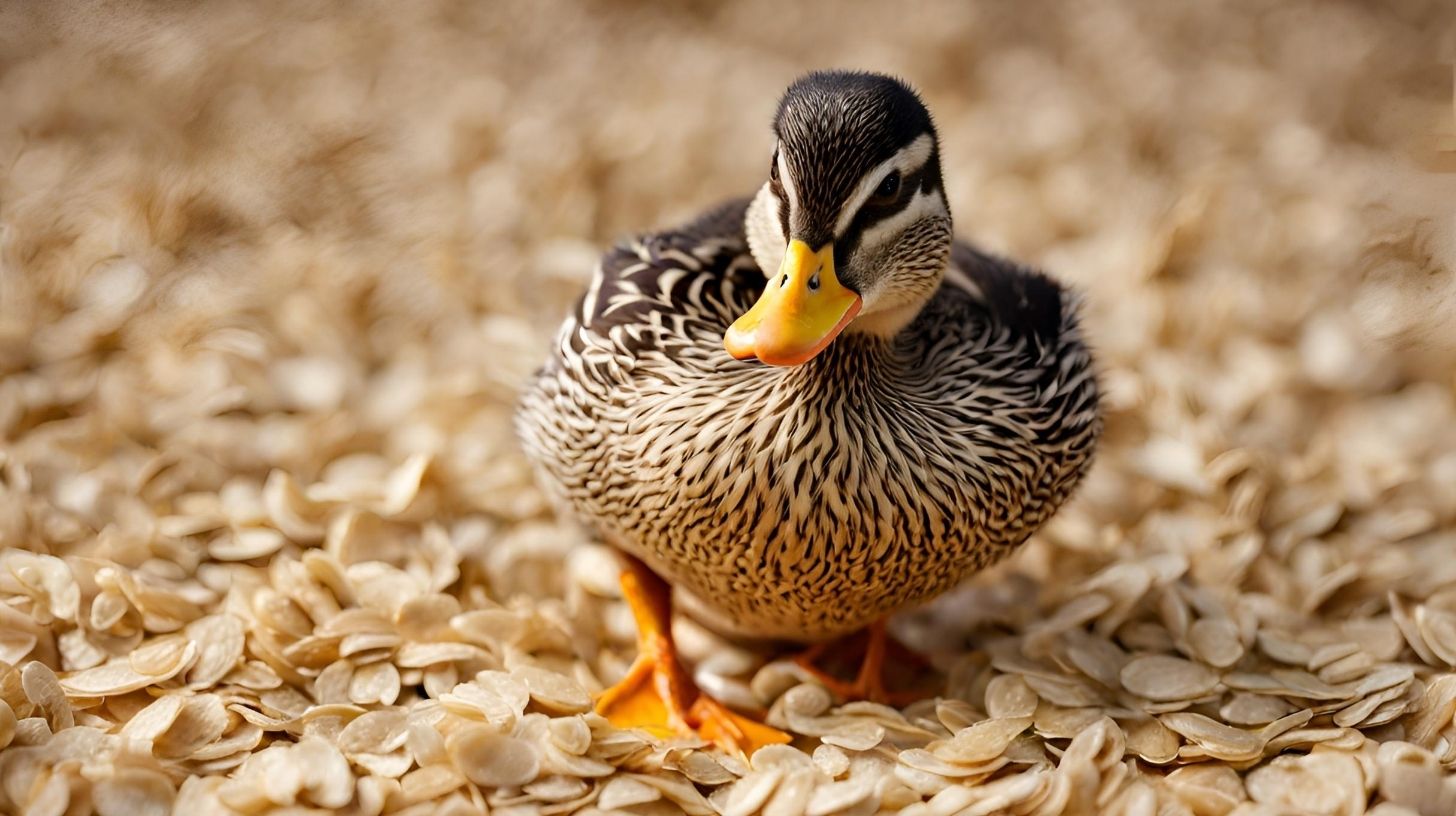Do Ducks Eat Uncooked Rice? A Complete Guide
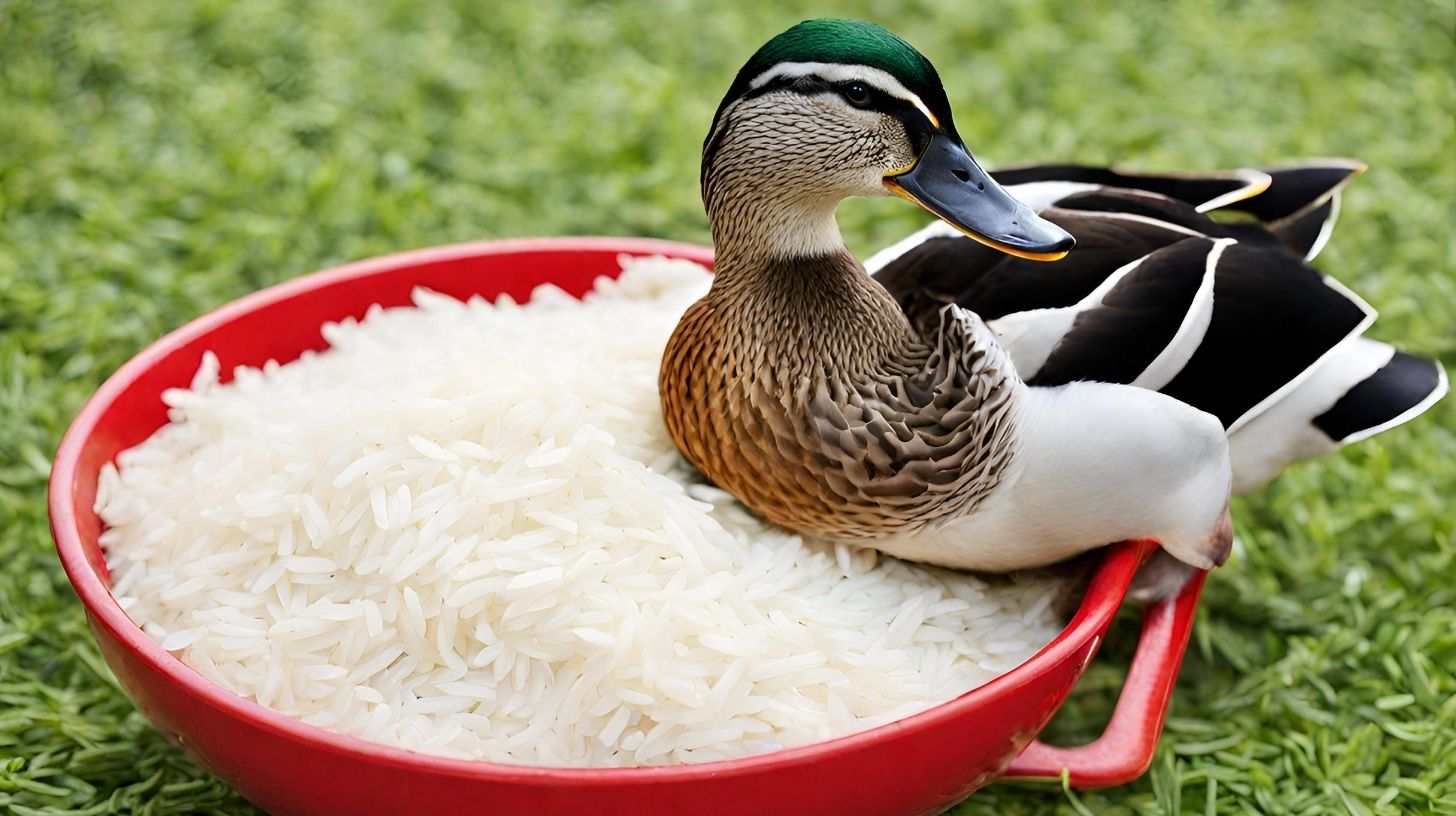
Table of content:
- Is It Safe for Ducks to Eat Uncooked Rice?
- Is It Okay for Ducks to Eat Rice?
- Should You Feed Ducks Rice?
- Can You Feed Ducks Uncooked Rice at Weddings?
- What Happens If Ducks Eat Rice?
- Why You Shouldn’t Feed Ducks Bread
- What Can You Feed Ducks Besides Bread?
- Are Breadcrumbs Bad for Ducks?
- Good Snacks for Ducks Besides Bread
- What Do Wild Ducks Eat?
- Frequently Asked Questions
- Conclusion
Rice is a common snack or meal ingredient for humans. However, many people wonder if uncooked rice can make up part of a healthy diet for ducks. This comprehensive article covers all the key questions and facts about feeding rice to ducks.
Key Takeaways:
- Uncooked, dry rice expands in ducks’ stomachs and can cause health issues.
- Cooked rice is safer, but ducks can’t live on rice alone. They need balanced nutrition.
- Bread and crackers also expand in ducks’ stomachs, so moderation is key.
- The best duck diet mimics what they eat in the wild – protein, plants, seeds, and insects.
Rice is a versatile cereal grain consumed by humans across the globe. But what happens if ducks eat this common uncooked starch?
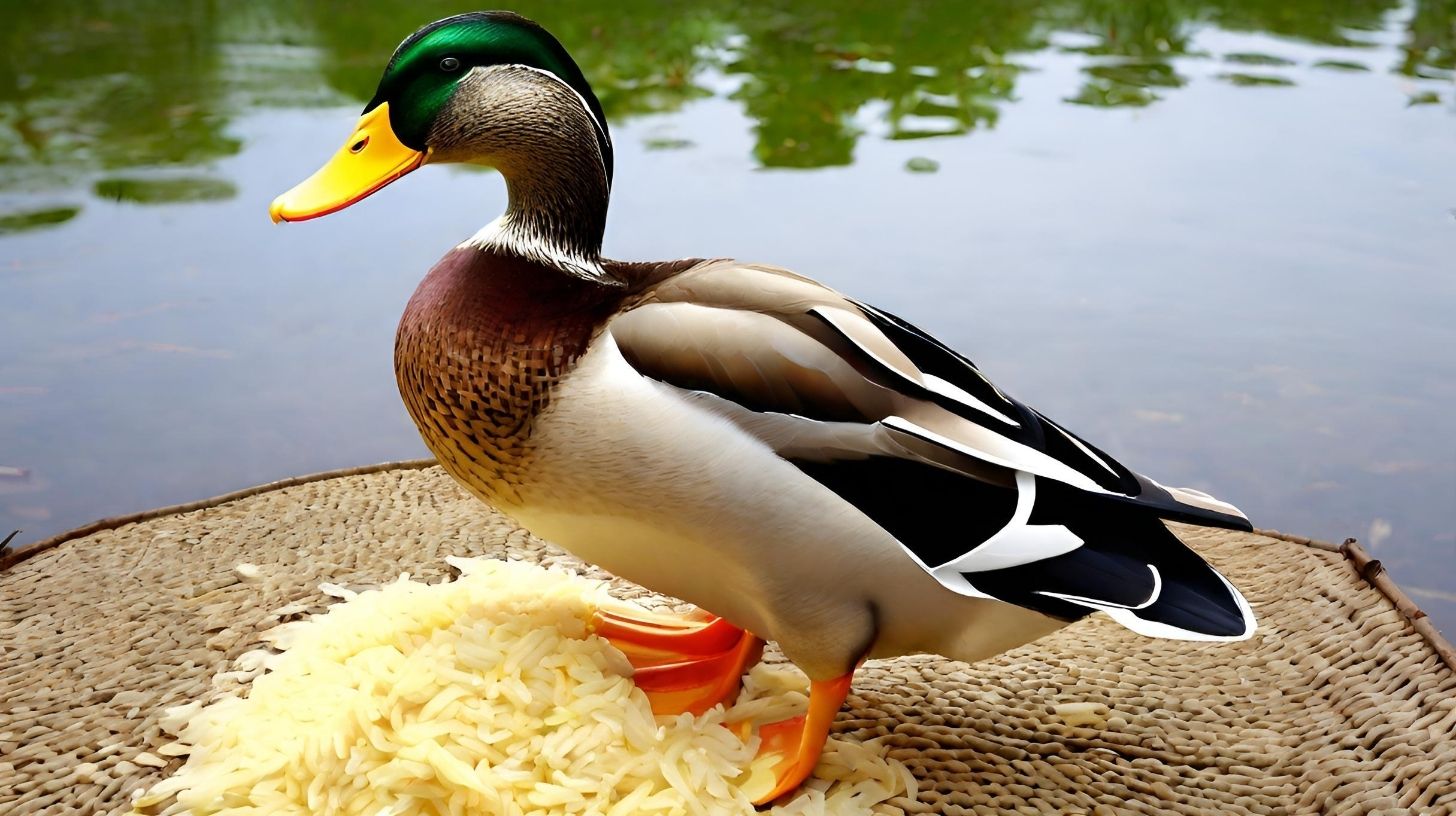 Is It Safe for Ducks to Eat Uncooked Rice?
Is It Safe for Ducks to Eat Uncooked Rice?
Uncooked rice is not recommended for ducks. Ducks’ digestive systems differ from humans and many mammals. Their gastrointestinal tract is shorter. When ducks eat dry, uncooked rice, it can absorb moisture and expand rapidly in their upper digestive tract or crop.
This can obstruct their esophagus, potentially causing choking or impacting the duck’s ability to swallow food and water. Bloating and expanding rice can also press on ducks’ nerves and organs, leading to illness.
So it’s best to avoid feeding uncooked rice to ducks altogether. The same risk applies to other uncooked grains and dry starches like pasta, breadcrumbs, or oats. Wait until you read the cooked rice section below before offering any rice to ducks.
Is It Okay for Ducks to Eat Rice?
Simply cooking rice makes it safer. The rice grains absorb moisture and expand during cooking. This reduces the risk of dry, uncooked rice grains rapidly expanding inside a duck.
Cooked rice won’t immediately harm ducks in small amounts. However, ducks cannot healthily subsist on rice alone. They need a varied, balanced diet. An all-rice diet lacks key vitamins and minerals ducks need for development, disease resistance, and reproduction.
Rice and other grains offer ducks carbohydrates. But ducks require higher levels of protein than humans do. Without enough protein from sources like insects, fish and vegetation, ducks can develop heart, liver and growth problems.
So only feed small amounts of cooked rice as an occasional snack. Never rely on rice as a staple duck food.
Should You Feed Ducks Rice?
Ducks will eagerly eat rice, especially white bread and other starches. But as mentioned, rice lacks the balanced nutrition ducks need.
Here are some healthier alternatives to offer ducks:
- Chopped kale, spinach or lettuce
- Diced grapes or berries
- Oats, barley or other grains
- Chopped veggie scraps
- Duck feed or birdseed
- Mealworms, crickets or maggots
Ducks forage a diverse diet in the wild. Their preferences include:
- Aquatic plants like duckweed
- Grasses, reeds and leafy greens
- Insects, snails and small fish
- Seeds from grasses and flowering plants
Ideally, tailor any supplemental feeding to mimic their varied natural diet. Rice alone is not balanced nutrition for domestic or wild ducks.
Can You Feed Ducks Uncooked Rice at Weddings?
Throwing uncooked rice at weddings is a cultural tradition in some regions. However, rice can harm ducks and wildlife. Many cities have banned rice tossing at lakes or ponds for this reason.
Instead, consider birdseed, which won’t expand dangerously in ducks’ stomachs. Oats and corn kernels are safer alternatives too. Just be sure any leftovers get cleaned up after the festivities. Leaving large amounts of rice or birdseed can lead to fouled water.
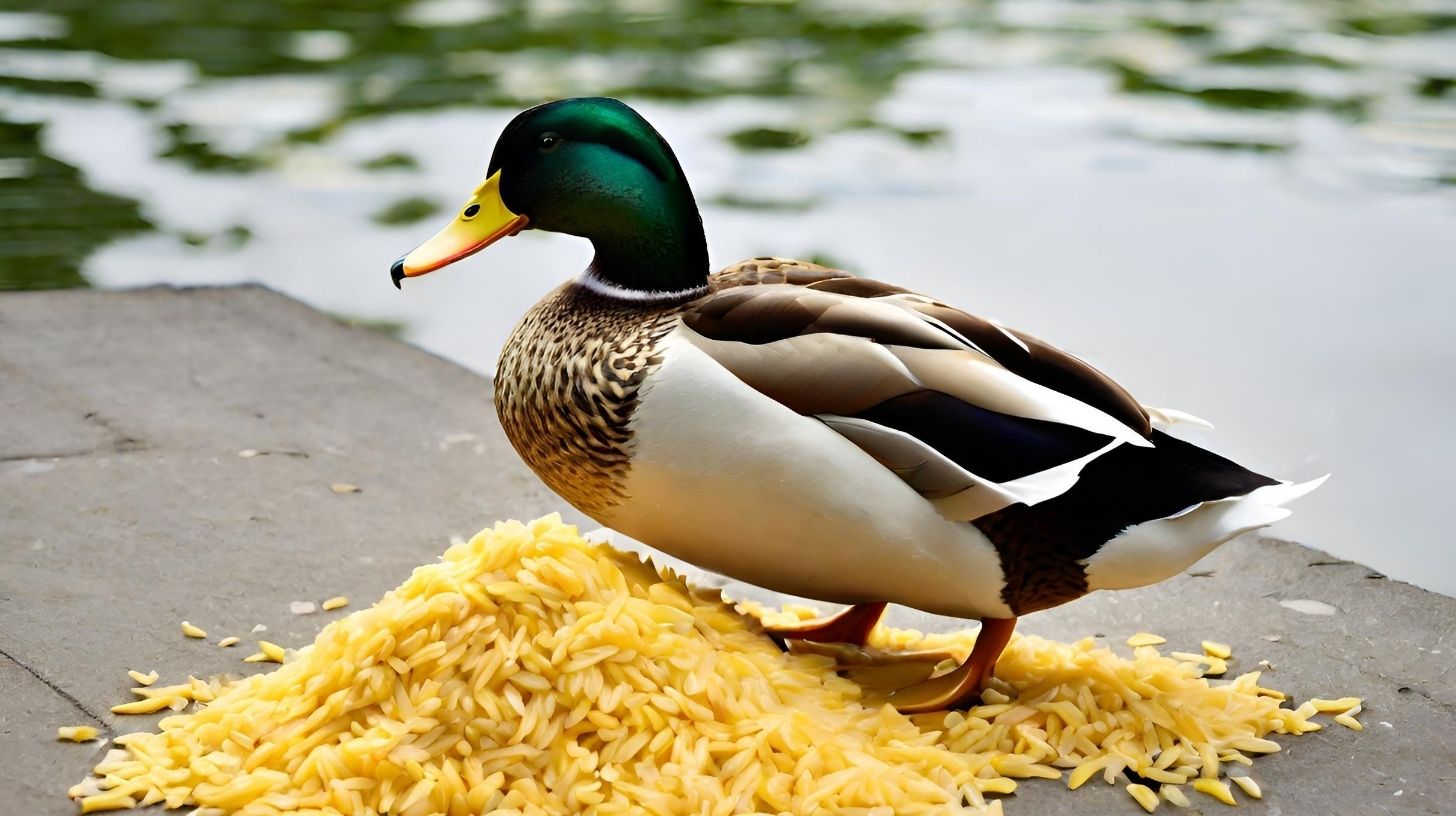 What Happens If Ducks Eat Rice?
What Happens If Ducks Eat Rice?
If ducks eat a small amount of uncooked rice, it may pass through their digestive system without harm. But they can suffer if they consume large amounts.
Dry, uncooked rice absorbs moisture in ducks’ esophagus and crop, then rapidly expands. Problems this may cause include:
- Choking: Expanding rice obstructs the esophagus. Ducks struggle to breathe and can suffocate.
- Impacted crop: Rice blocks food from entering the stomach. Ducks can’t swallow or eat.
- Malnutrition: Rice lacks nutrients ducks need. An exclusive rice diet leads to deficiencies.
- BLOAT: Expanding rice presses on internal organs. This can lead to pain, distress, and death.
- Angel wing: High carb diets like rice disrupt bone development in ducklings’ wings.
Cooked rice reduces risks. But an all-rice diet will still lead to malnutrition and health issues over time. The healthiest is to feed ducks a varied diet.
Why You Shouldn’t Feed Ducks Bread
Many people enjoy feeding ducks bread. However, bread brings many of the same risks as rice:
- The yeast in bread produces gas during digestion. This can cause painful internal bloating.
- Bread can also expand and clog ducks’ digestive tracts.
- Bread offers little nutrition. Ducks filled up on empty calories may not seek healthier foods.
- Moldy, rotten bread can make ducks sick.
- Excess bread pollutes waterways.
So bread should also only be an occasional duck treat, not a dietary staple. Follow the healthy feeding tips covered earlier instead.
What Can You Feed Ducks Besides Bread?
Here are some healthy alternatives to bread for ducks:
- Chopped lettuce or kale
- Birdseed or duck feed
- Oats, barley, rice or quinoa
- Diced fruit like grapes
In addition to the nutrition they provide, these foods do the following:
- Settle on top of water, so less is wasted
- Don’t pollute waterways as quickly
- Offer variety and enrichment in ducks’ diets
When feeding ducks, follow these additional tips:
- Only offer as much as they can eat in one feeding
- Spread the food out, so all ducks can access it
- Stay back so ducks don’t become reliant on humans
- Don’t feed ducks near roads or other hazards
Are Breadcrumbs Bad for Ducks?
Dry breadcrumbs carry the same risks as other uncooked starches and grains. They can rapidly absorb water and expand in ducks’ digestive tracts.
So resist the temptation to feed ducks unwanted stale bread. Dry out stale bread completely and crumble it instead of making breadcrumbs. The crumbs pose an unnecessary hazard.
If cooking a dish for ducks using breadcrumbs, thoroughly moisten the crumbs first. Or opt for healthier binders like oats or barley instead.
Good Snacks for Ducks Besides Bread
Ducks forage a diverse diet in the wild and need variety. Here are some healthy, natural treat options:
Fresh Greens
Chopped lettuce, kale, spinach and swiss chard are nutritious options ducks enjoy. Romaine and other lettuces provide hydration too. Avoid iceberg lettuce though, as it has little nutritional value.
Fresh Fruits
Chop apples, grapes, melons, berries and citrus fruits into bite-sized pieces. These provide ducks with vitamins and hydration.
Cooked Grains
Cook grains like rice, barley, millet or quinoa until soft, then chop into small bits. These offer carbohydrates ducks need.
Vegetable Scraps
Ducks will eat any fresh veggies – greens, squash, peas, peppers. Chop larger scraps into bite-sized pieces. Avoid raw potatoes, which are toxic.
Duck Feed
Look for species-specific blends at feed stores. These provide balanced nutrition ducks require. Sprinkle on the water so all ducks can access it.
Insects
Crickets, mealworms and maggots offer protein. Ducks relish hunting down live insects.
Vary treats to give ducks nutritional variety. Avoid overfeeding – provide only what they’ll finish at one meal. Then continue supplementing their wild foraging.
What Do Wild Ducks Eat?
Wild ducks don’t subsist on bread and rice handed out in parks. Their diverse diet includes:
Aquatic Plants
Duckweed, water lily tubers, pond grasses, reeds, sedges, rushes, and wild rice.
Seeds
From aquatic plants, grasses, flowering plants like bur reed and smartweed.
Insects
Dragonflies, damselflies, mosquitoes, mayflies, caddisflies, water fleas.
Crustaceans
Shrimp, snails, crayfish, water fleas, tadpoles, small fish.
Green Plants
Algae, aquatic plants, grasses, sedges, flowering plants, leafy greens, seeds.
Fruits
Berries and seeds from flowering plants near the water.
Wild ducks get all their hydration from their food. Their varied diet provides balanced nutrition without rice or bread. Mimic it when supplementally feeding ducks.
Frequently Asked Questions
How much rice can ducks eat safely?
A few bites of cooked rice are fine as an occasional treat. But rice shouldn’t make up the bulk of any duck’s diet. For a daily treat, limit rice to a tablespoon or two per duck.
Do ducks digest rice?
Ducks do digest rice, but not as efficiently as their natural foods. The starch in rice is a carbohydrate source for ducks. However, rice lacks the proteins, vitamins and minerals ducks need.
Can rice cause angel wings in ducks?
Yes. Angel wing is a condition where a duckling’s wing feathers grow irregularly due to nutritional deficiencies. High-carb diets like rice and bread typically cause angel wing. Feeding a varied, healthy diet prevents it.
Can ducks have too much protein?
Ducks require more protein than many animals – up to 20% of their diet. feeding only rice lacks crucial protein. Add sources like insects, fish, worms, and vegetation. Excess protein won’t harm ducks as long as their overall diet is balanced.
Will leftover rice hurt ducks?
Cooked rice left uneaten won’t immediately harm ducks. But leaving large amounts can lead to fouled water as it decomposes. Feed only as much food as ducks can eat in one sitting, then remove any uneaten portion.
Conclusion
Rice is a common question when it comes to feeding ducks. But uncooked rice can rapidly expand and cause fatal choking. While cooked rice is safer, ducks need a nutritious, varied diet. Rice alone lacks key protein, vitamins and minerals. Starchy white bread brings similar risks.
For a healthy duck diet, provide a diversity of foods: fresh greens, fruits, seeds, cooked grains, insects, and duck feed. Avoid overfeeding, and be sure to clean up any uneaten food remains. Following these tips will keep ducks happy and healthy.
Welcome. I’m Adreena Shanum, the proud owner of this website, and I am incredibly passionate about animals, especially poultry. I founded adreenapets.com as a labor of love, stemming from my desire to share my knowledge and experiences with poultry enthusiasts worldwide.


